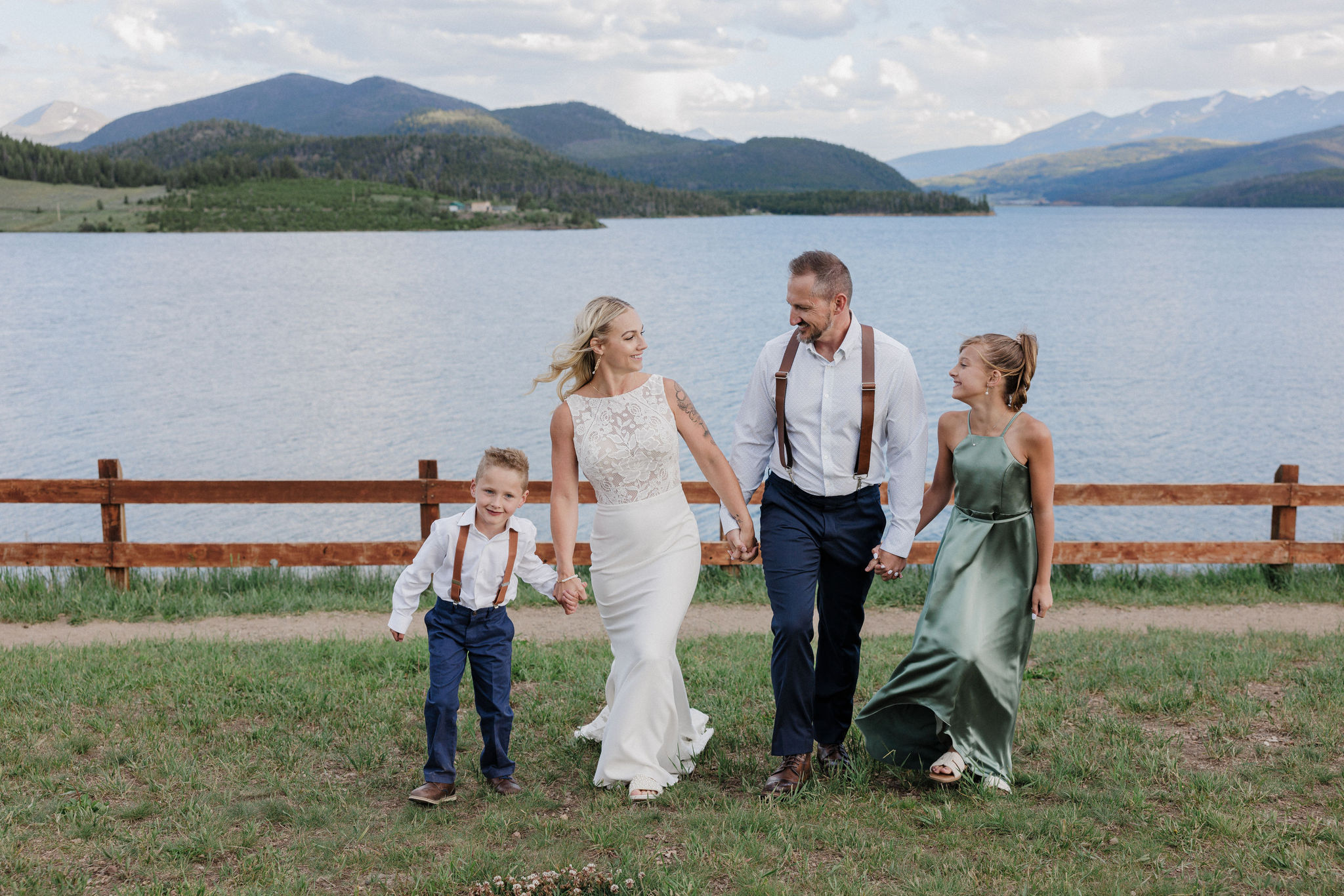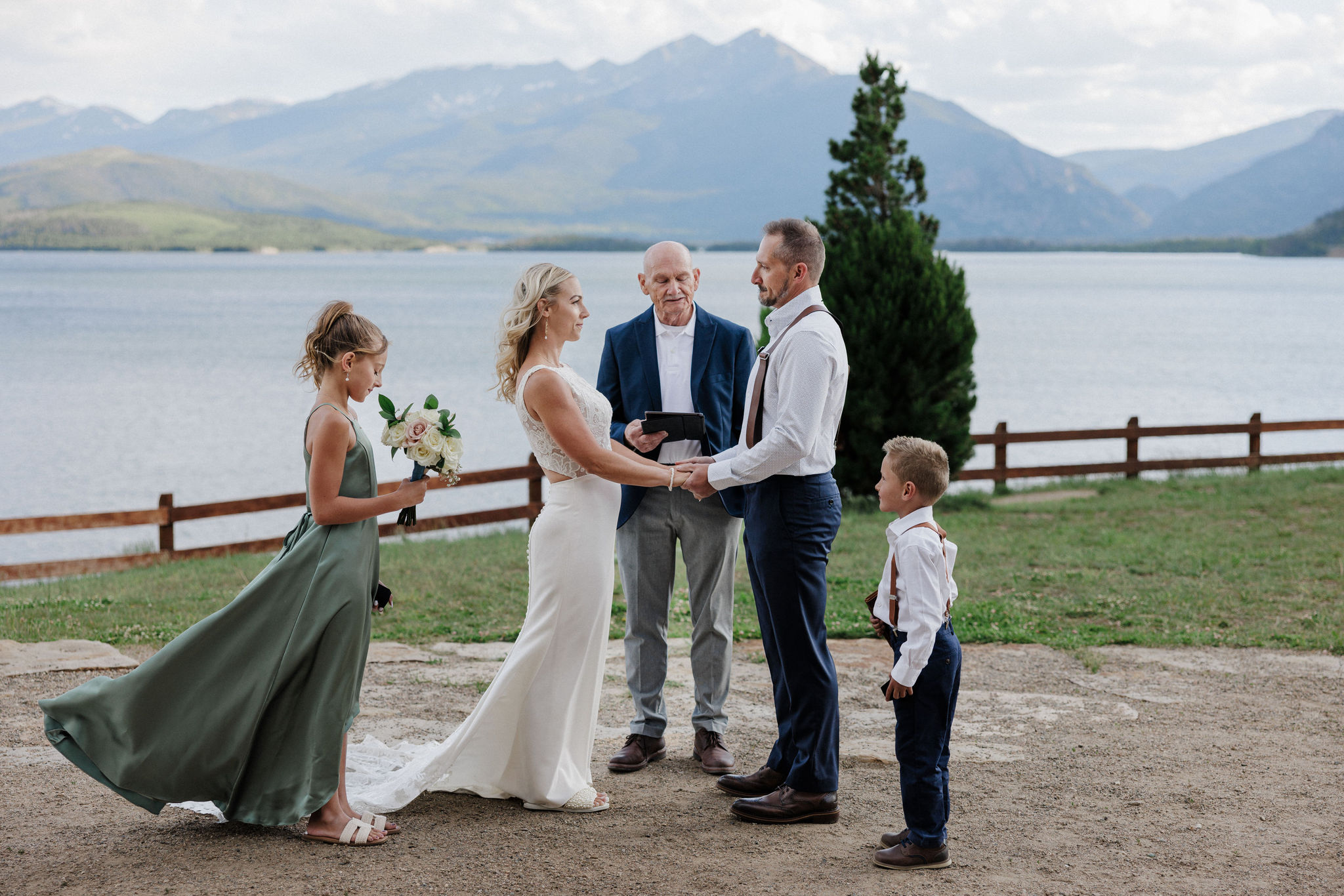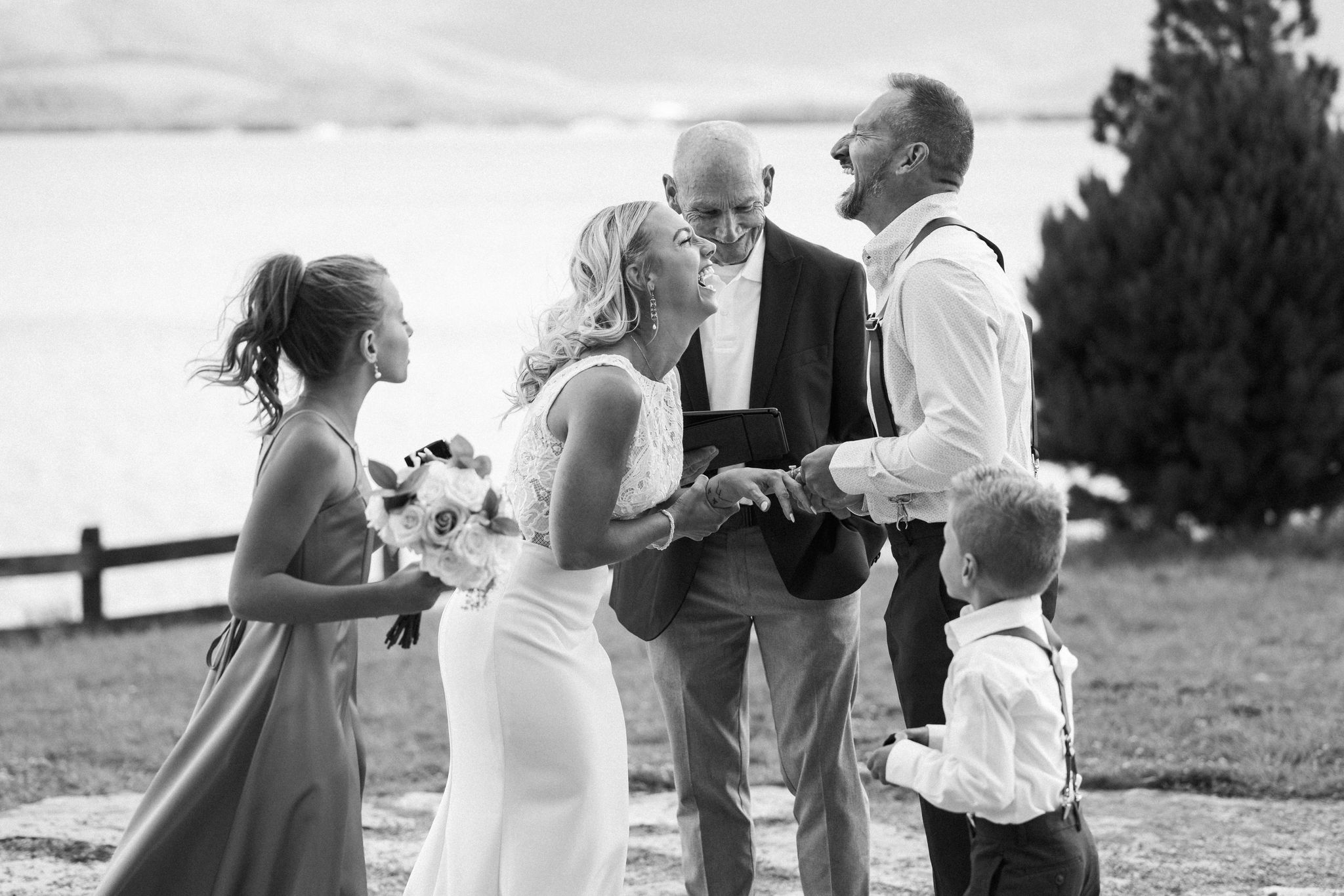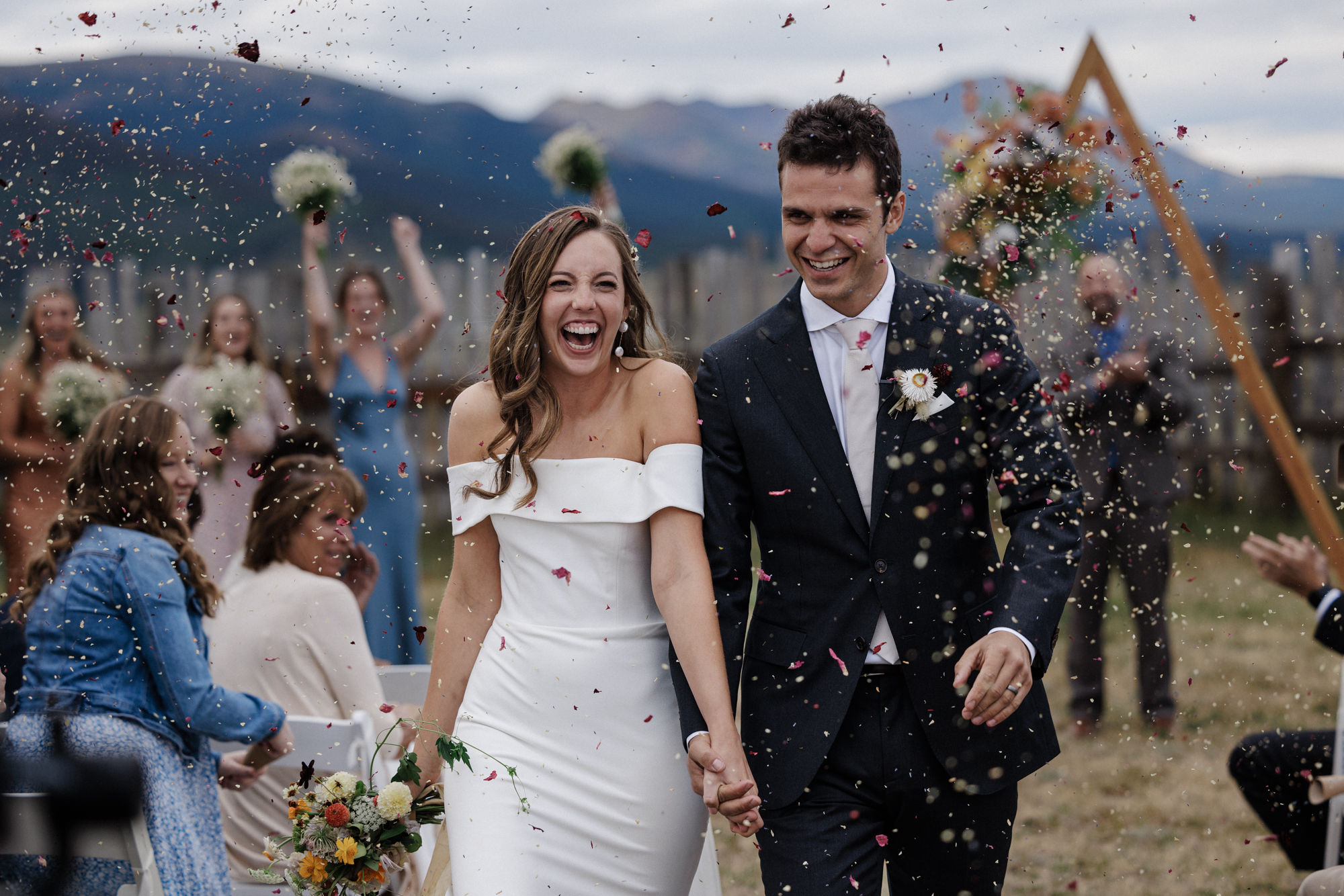Colorado micro wedding + elopement photographer
Hey, friend.
I'm Stephanie
Your photographer + intimate wedding planning wing woman.
I create unrushed and intentional wedding experiences so you can be fully present and authentically you on your best day.
Get to
know me
Packages + Pricing
Contact Me
Wedding planning, like any unpaid labor, requires couples to find equitable ways to share the workload. Unfortunately, in the process, it isn’t uncommon for one partner to find themselves burdened with a disproportionate amount of the tasks. While this imbalance often stems from gender-based expectations, it is far from ideal given that most couples juggle busy schedules and full-time jobs. However, by actively involving your partner in the planning process, wedding planning can become an enjoyable and rewarding experience for you both.
In this blog post, I’ll share practical ways to involve your partner in wedding planning, some common disagreements that can arise during wedding planning, and tips to manage conflict. By working together, you can create a wedding that reflects both of your visions, prevents wedding planning resentment, and strengthens your bond along the way.
Tips on How to Involve Your Partner in Wedding Planning
Common Wedding Planning Disagreements
How to Resolve Wedding Planning Disagreements

Tips on How to Involve Your Partner in Wedding Planning
Encourage Open Communication
First and foremost, foster an environment where both you and your partner feel comfortable sharing your thoughts, visions, and feelings about your wedding plans. Open communication is key to addressing concerns early and avoiding misunderstandings. Remember, the goal is to make the planning process enjoyable for both of you.
Of particular importance, be sure to maintain clear communication regarding your wedding budget. Doing so ensures you’re both on the same page and have a clear financial plan. As you discuss your wedding budget, be sure to communicate regarding your wedding day priorities, including your location and your guest list. By discussing your budget openly and early, you’ll prevent financial surprises and encourage informed decision making throughout your wedding planning journey together.
Create a Wedding-Specific Email Address
Creating a dedicated wedding email address is a practical step that can streamline how both you and your partner engage in the planning process. Directing all wedding-related communications to one place ensures both of you can easily access important information and prevents relevant emails from getting lost in personal inboxes. Utilizing a shared space not only increases organization but also ensures that neither of you misses crucial details in the process.
A wedding-specific email also simplifies communication with vendors. Many vendors use client relationship management (CRM) platforms that allow only one email address per client. By using a wedding-specific email, you ensure that both you and your partner are included in all correspondence. So that you are both kept up-to-date, set up your wedding email address to forward messages to both of your personal inboxes.
Additionally, creating a wedding email makes managing subscriptions easier. After your wedding, you can unsubscribe from related lists without sifting through personal emails. This approach helps keep your planning process smooth and keeps you both actively involved.



Make a Clear To-Do List
Creating a clear and detailed to-do list is essential for ensuring both you and your partner stay on track throughout your wedding planning journey. Start by using your personal wedding planning checklist, tailored to reflect both your visions and priorities. Display this checklist somewhere both of you can easily see it—whether on a shared digital platform or a physical board—so that each task is visible and clearly outlined.
Having a transparent list not only helps you break down wedding planning into manageable, bite-sized pieces but also allows both partners to see what needs to be done and who is responsible for each task. As you and your partner check off completed tasks, you’ll both have a clear sense of progress and what’s coming up next.
This approach fosters collaboration and ensures that neither of you is left out of the planning loop. It also helps prevent any task from slipping through the cracks, making the planning process more organized and less overwhelming.
For a month-by-month breakdown of wedding planning tasks, check out my blog linked here.
Decide Which Tasks to Share Versus Split
Deciding which tasks to share and which to split is crucial for a smooth wedding planning experience. Start by identifying tasks that both you and your partner are equally excited about or interested in. These tasks are often best completed together, as they can make the planning process more enjoyable. For instance, you might both want to be involved in DIY projects, tastings, or venue tours, which can be more fun when done as a team.
For tasks that you choose to split, it’s important to divide them cleanly. Each partner should take full responsibility for their assigned tasks, from start to finish. It’s also beneficial to set specific due dates to ensure that divided tasks are completed in a timely manner. This helps prevent one person from feeling burdened by managing the other’s progress toward completion.
Keep in mind that splitting tasks doesn’t always mean a 50/50 division. How you divide tasks should be based on your and your partner’s preferences, interests, and strengths. By working together to complete tasks you both enjoy and dividing responsibilities where it makes sense, you can maintain balance as you effectively complete your wedding planning to-do list.
Schedule Regular Wedding Planning Meetings
Setting aside intentional time each week for wedding planning check-ins is an effective way to keep both you and your partner on the same page. Use this time to review your checklist, discuss upcoming appointments, and address any deadlines or deposits that are approaching. Regular check-ins ensure that both you and your partner remain informed of your progress, aware of any roadblocks, and are involved in the decision-making process.
To make these weekly check-ins more enjoyable, consider turning them into a weekly date night! Instead of viewing planning tasks as chores, treat them as opportunities to create memories and have fun together. By turning these sessions into memorable experiences, you’ll not only stay on top of your planning but also create positive associations with the process.
Making your wedding planning a collaborative and enjoyable activity helps you both stay in the know and makes the journey to “I do” more rewarding.


Involve Your Partner in Vendor Meetings
Including your partner in vendor meetings ensures that both of you have a hand in the decision-making process. Having your partner present allows for real-time discussions, making it easier to address any questions, concerns, and preferences as they arise. This joint participation helps both of you stay aligned regarding your choices, costs, and expectations.
Attending these meetings together ensures that neither of you is left out of key decisions and fosters a shared understanding of what each vendor will deliver. It also provides an opportunity for you both to gauge the vendor’s compatibility with your wedding style and preferences.
Celebrate Wedding Planning Milestones Together
Acknowledging and celebrating planning milestones adds excitement to your wedding planning journey. Whether you’ve finalized your guest list, selected your menu, or hired your photographer, taking time to celebrate these key moments infuses the process with enjoyment and keeps the experience fresh.
Your celebrations don’t need to be elaborate—simple gestures like having a special toast, grabbing ice cream, or enjoying a living room dance party can make a big difference. Choose a way of celebrating that feels right for both of you and savor the progress you’re making together.
Common Wedding Planning Disagreements
Wedding planning is often a whirlwind of excitement mixed with stress and high emotion. With so many details to handle and decisions to make, it’s no surprise that disagreements can arise, even when both partners have the best intentions.
Whether it’s a result of differing opinions, mental overload, or challenging decisions, conflicts can be a natural part of the planning process. Understanding these common sources of disagreement and finding ways to constructively manage them can help prevent conflicts from growing into wedding planning resentment.



Wedding Budget Conflicts
Weddings can be a significant financial investment, and conflicts over money are quite common during the planning process. Disagreements can arise regarding how to allocate your budget or potential budget overages. To prevent these issues, it’s crucial to establish a clear budget from the beginning, based on your priorities, vision, and personal finances. Discussing your budget regularly during your weekly check-ins can help keep both of you on the same page and address any concerns before they escalate.
Additionally, maintaining a centralized location for tracking your budget ensures that you both have access to up-to-date information and can easily review your financial status. If you need a refresher and guidance on setting and tracking your wedding budget, you can revisit my blog.
Guest Count Conflicts
Guest count can become a significant point of contention if you and your partner aren’t aligned, especially since it directly impacts your wedding budget. Differences in the number of guests each of you wants to invite, if any, are common and can stem from having disproportionately sized circles of close friends and family. While it’s natural to have different perspectives, managing your guest list is a crucial step in planning your wedding.
The process of trimming your invite list can be challenging due to concerns about offending loved ones, managing expectations, and maintaining relationships. However, by maintaining open and honest communication, setting clear boundaries, and approaching the situation with understanding, you can reach a compromise that aligns with your vision. For practical tips on simplifying this process and overcoming these challenges, check out my detailed guide linked here.



In-Law Conflicts
If you find your in-laws have become a source of conflict between you and your partner, you’re far from alone. Over 70% of couples report that their parents-in-law have caused strain in their relationship.
As with most conflict, communication is key. Seek to have an open and honest conversation with your partner about how your in-laws’ actions are impacting you. Express your feelings without seeking to relive them or make your partner the target of those intense emotions. Lay out the boundaries that you intend to set with your in-laws and see if you can find common ground in setting boundaries together.
Different Wedding Visions
Starting with clear priorities is essential to aligning your individual wedding day visions. Each person may have different ideas, whether it’s opting for an intimate elopement over a big wedding, deciding how to allocate your budget, or even choosing your menu. Establishing your priorities early on provides a solid foundation for making decisions together.
Discussing your priorities openly can help both of you understand each other’s perspectives and find a compromise that reflects both of your visions. Click this link if you need additional insights on how to refine your wedding priorities.

Time Commitments
Wedding planning can sometimes start to feel like its own job, and balancing wedding-related to-do’s with your career, household responsibilities, and personal commitments can become overwhelming as a result. It’s common for one partner to feel like they or the other is spending all their time on wedding planning, leading to frustration.
To alleviate this pressure and prevent misunderstandings, plan your wedding around your schedules. Acknowledge what each person can realistically handle and delegate tasks accordingly. By splitting tasks based on each person’s availability and strengths, both partners can contribute without feeling overburdened, helping maintain harmony and reduce stress.
Outside Opinions
Outside opinions that differ from your and your partner’s vision for your wedding can become a common source of disagreement. Friends and family may have strong perspectives, and it can be especially challenging when your loved ones try to pressure you or your partner into making certain decisions. While crafting your intimate wedding day, remember that this special day is fundamentally about you and your partner. It’s crucial to remind yourselves that you are on the same side in wanting a wedding day that authentically reflects you as a couple.
Make sure you have each other’s back and offer support in your decisions. If your nearest and dearest struggle with your choices, stay confident and grounded knowing you support each other’s vision. This mutual support will help you navigate outside opinions, avoid conflicts, and stay true to your unique celebration.

How to Resolve Wedding Planning Disagreements
Be Each Other’s Support
Resolving wedding planning disagreements starts with a solid foundation of mutual support. Since wedding planning is a unique and individual experience, it’s essential for you and your partner to act as each other’s strongest allies. Recognize that you both face similar challenges, and offer empathy and understanding during tough moments.
To effectively handle conflicts, actively listen to each other’s concerns and validate each other’s feelings. Discuss your stressors and expectations openly and address issues as they arise. Being flexible and supportive helps prevent misunderstandings and keeps the planning process collaborative and on track. By focusing on each other’s emotional needs and maintaining a supportive stance, you can turn potential conflicts into opportunities for growth and unity.

Keep Each Other Updated
Keeping each other “in the know” is crucial for both preventing and resolving wedding planning disagreements. It’s important for both partners to stay informed about the progress of your wedding plans, possible changes to those plans, and any strong emotions that may arise along the way. Surprises or last-minute changes to your budget, planning tasks, or wedding vision can create stress and leave one partner feeling excluded from decision-making.
Communicate clear and regular updates about both the logistical aspects of planning and how you’re feeling throughout the process in order to prevent resentment from taking hold. Schedule weekly check-ins to discuss updates, share concerns, and proactively manage any frustrations. By keeping each other in the loop and providing a safe space for open dialogue, you foster a collaborative environment and help prevent misunderstandings.
Be Flexible and Willing to Compromise
It’s common for couples to have differing opinions when wedding planning, which may, in turn, require compromise and flexibility from both partners. Being open to negotiation and willing to find middle ground can help effectively resolve disagreements. Sit down with your partner to discuss differing views and explore ways to accommodate each other’s preferences.
If there’s something that’s particularly meaningful to your partner, consider how you might adjust other aspects of your wedding to include their wishes. Flexibility and a willingness to compromise can prevent conflicts from escalating and keep the planning process positive. By working together to find solutions that satisfy both you and your partner, you ensure that both of you feel valued and heard.
Prioritize Self-Care and Balance
Wedding planning can often feel overwhelming, so it’s important to prioritize self-care and balance. Regular breaks help you recharge and approach tasks with a clearer mind, preventing conflicts that can bubble up due to burnout.
Remember, the hobbies and interests that brought you joy before wedding planning still deserve a prime spot in your engaged era. By maintaining balance, you can handle disagreements with a fresh perspective. Your well-being and happiness should remain a top priority leading up to and long past your wedding day!


Get to the Heart of the Issue
To effectively resolve wedding planning conflicts, it’s important to get to the root of the problem. Often, disagreements stem from deeper issues or stressors. For example, if one partner prefers a smaller wedding, it might be because they value privacy or are more introverted. Understanding these underlying reasons helps you empathize and find common ground and creative solutions.
By exploring each other’s motivations, values, past experiences, and unique perspectives, you can better grasp why your partner feels a certain way. This deeper understanding can grow your relationship and make it easier to reach an agreement.
Effective resolution involves self-awareness, active listening, and empathy. By showing these qualities, you can better appreciate your partner’s viewpoint and work together to find paths forward that make both of you happy.
Let’s Plan Your Intimate Wedding
Wedding planning is a journey that can be both joyful and challenging. To successfully navigate your journey to “I do,” focus on involving each other in the planning process, managing common disagreements, and addressing conflicts with empathy. By actively sharing responsibilities and communicating openly, you can ensure that you both feel heard, engaged, and valued. Additionally, tackling conflicts with a deeper understanding of each other’s motivations and maintaining a sense of balance through self-care will help you handle disagreements constructively.
Ultimately, the goal is to enjoy your journey as much as your wedding day itself—after all, it’s a whole chapter in your story. Embrace the planning process as a team, support each other through the highs and lows, and create a celebration that reflects your shared vision. If you’d like help planning your micro wedding or elopement, reach out. I’d love to help you and your partner navigate this wedding planning journey together, making it as smooth and enjoyable as possible.

Questions to ask your wedding vendors before booking
How to set + Track your Micro Wedding or Elopement Budget
What to Do After You Elope | Post-Elopement Party + Activity Ideas
Learn More
Learn More
Learn More
While you're here
Get inspired...
Here are some other resources I think you'll really love:
Ready to plan your unforgettable micro wedding or elopement?
A love like yours deserves more than just pretty pictures - which is why my role is so much more than just your photographer. I'm here to design a one-of-a-kind wedding experience that centers the two of you and celebrates your love story.
Get to Know Me
Heyyyyy, I'm Stephanie!
Your photographer + wedding planning partner
Let's create a wedding day you'll enjoy every minute of!
Packages + Pricing
Reach out to get started.
It takes less than 1 minute.
Don’t feel like you have things fully figured out? No worries! Most couples who inquire with me don’t yet know their date or location.
If you can dream it, we can create it.
Download your elopement planning checklist to start planning your dream day.
Ready to start planning, but not ready to reach out?
Get the guide
contact
about
Colorado Micro wedding + elopement photographer
©2026 Stephanie Yves Photography | all rights reserved | privacy policy | print release | site credit karima creative
Denver | Breckenridge | Boulder | Colorado Springs | Estes Park | Destination | Airbnb | VRBO | Micro Weddings | Vail | Aspen | Rocky Mountain National Park | Crested Butte
Where to Elope
How to Elope
blog
Engagements + Proposals
@stephanieyvesphotography